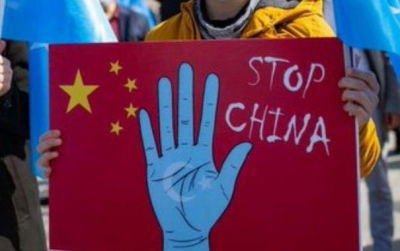America
U.S. Expansion of Import Ban on Forced Labor Products Welcomed by Uyghur Advocacy Groups

Washington DC,August 10 :
The East Turkistan National Movement, which seeks to expose the Uyghur Muslim minority and other ethnic minorities in Xinjiang to human rights violations, has expressed its gratitude to the United States government for its decision to outlaw products made with Uyghur forced labor. As of this writing, 73 Chinese entities are on the list of entities subject to the Uyghur Forced Labor Prevention Act, as the group pointed out in an X post. A total embargo on Chinese goods is what we demand.
The Center for Uyghur Studies also issued a statement in response to the US decision to impose further import bans on Chinese enterprises implicated in human rights abuses perpetrated against Uyghur citizens. The company names were added to the Uyghur Forced Labor Prevention Act Entity List, which limits imports associated with what the US government perceives as a continuing genocide of minorities in China's western Xinjiang province. The Center made this announcement on social networking site X. More than 70 companies are now associated with items including solar panels, cotton clothing, vinyl flooring, and car parts.
The United States government has broadened its import restriction on Chinese goods in response to allegations of human rights violations in China involving Uyghur people. As part of its continuous endeavor to remove products created using forced labor from the US supply chain, the Department of Homeland Security has added five more companies to its blacklist. In an effort to address and prevent the use of forced labor involving Uyghur Muslims and other ethnic minorities in China's Xinjiang region, the Uyghur Forced Labor Prevention Act (UFLPA) established the Uyghur Forced Labor Prevention Act Entity List.
According to the Center for Uyghur Studies, this list also includes organizations that helped the authorities of the Xinjiang Uyghur Autonomous Region smuggle Uyghurs, Kazakhs, Kyrgyz, and other oppressed peoples out of the area. It also encompasses those who acquire resources from the area or from people linked to the Xinjiang administration.
Uyghur Muslims and other ethnic minorities in China, especially in the Xinjiang area, endure human rights violations; the Center for Uyghur Studies seeks to study and bring attention to these issues. The Uyghur people and other ethnic minorities are allegedly held in what China refers to as "re-education camps," but which many foreign observers have characterized as detention centers or internment camps.
Detainees' cultural and religious habits are allegedly suppressed and indoctrinated at these institutions. Allegedly, inhumane working conditions and forced labor are commonplace in these camps. Their forced labor in industries including textiles, electronics, and agriculture is characterized by long hours and low wages. A number of human rights abuses, including the systematic incarceration and forced labor of Uyghurs in Xinjiang, have been brought to light by Human Rights Watch (HRW).
Also, significant global brands are linked to Uyghur labor in Xinjiang's textile industry, according to extensive investigations issued by the Australian Strategic Policy Institute (ASPI)



































